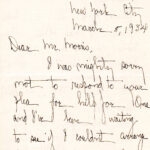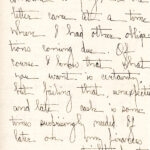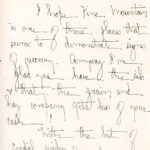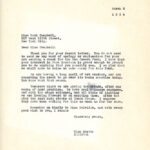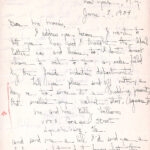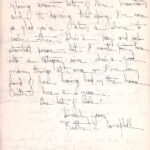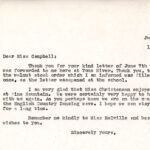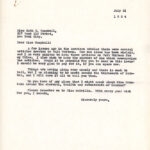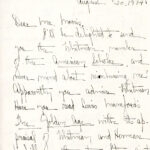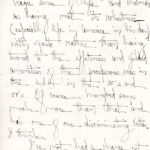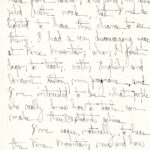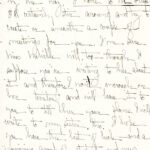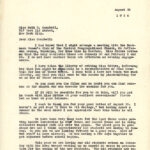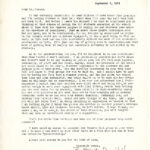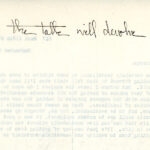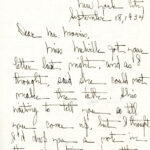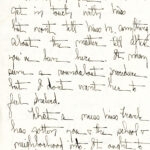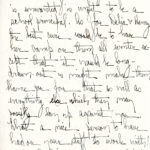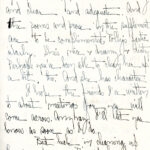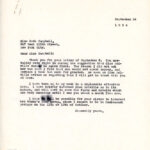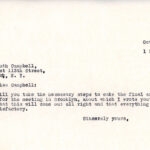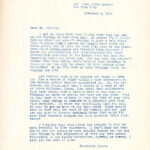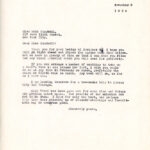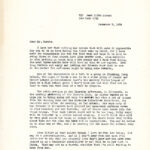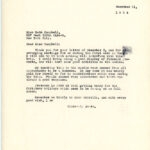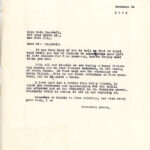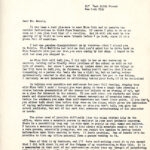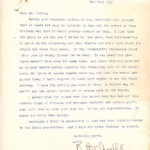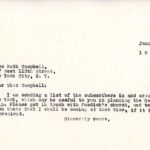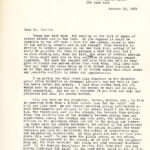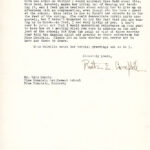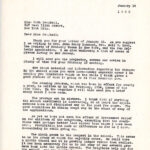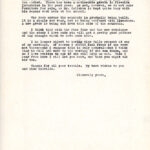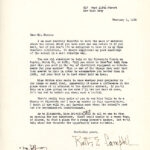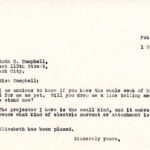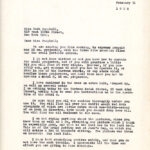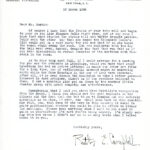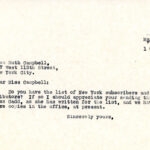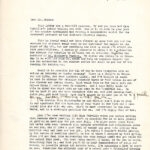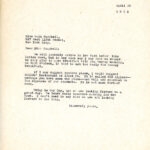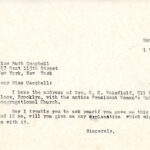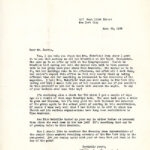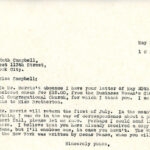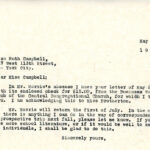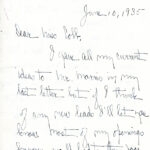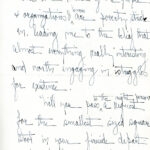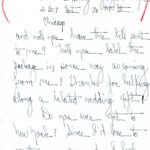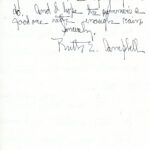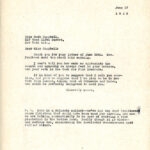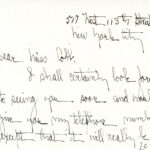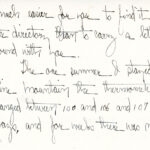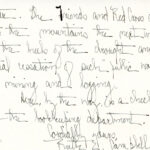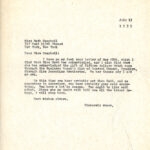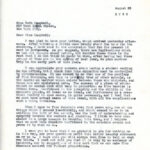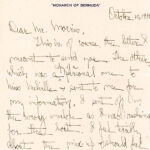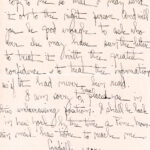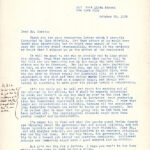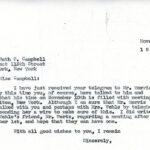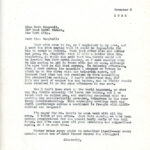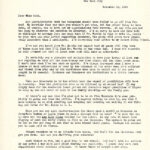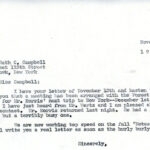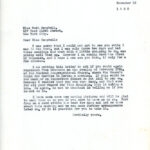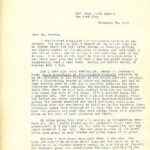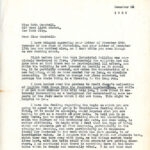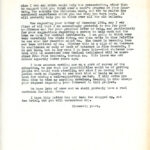Pine Mountain Settlement School
Series 09: BIOGRAPHY – Staff
Ruth Elizabeth Campbell
Office Secretary, Teacher (1927-1931); Advisory Board
Correspondence III, 1934-1935
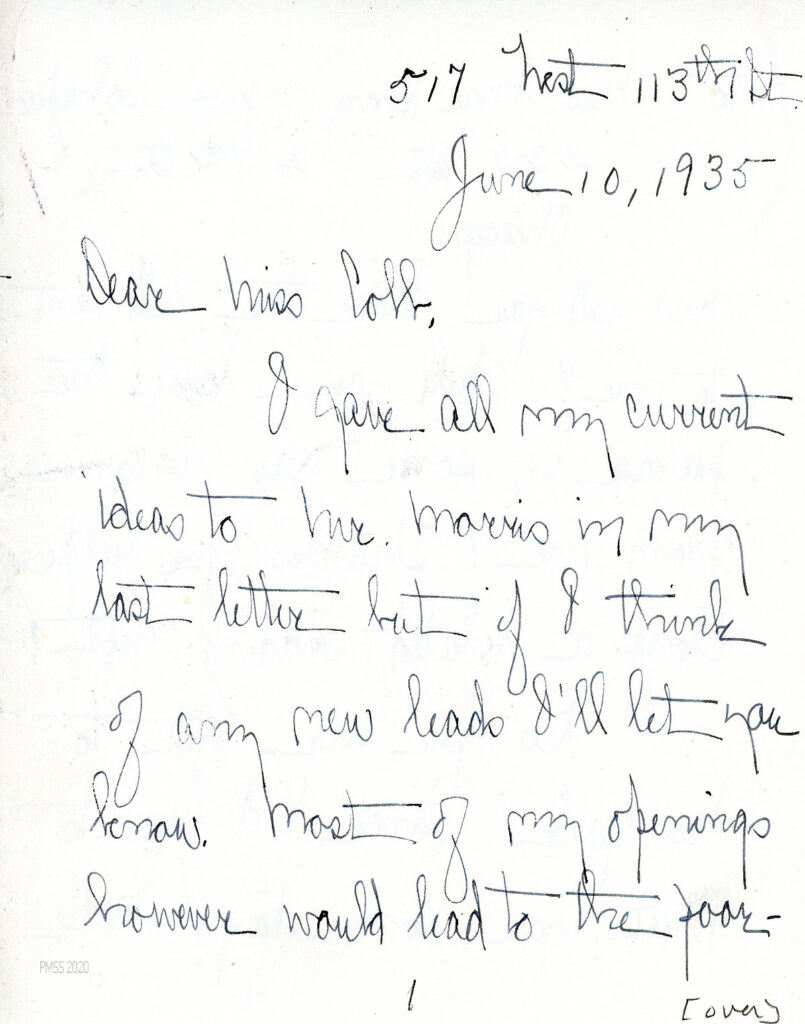
081 [campbell_ruth_e_081.jpg]
TAGS: Ruth Elizabeth Campbell, correspondence, Glyn Morris, Alice Cobb, Angela Melville, fundraising, philanthropy, Fireside Industries, Abby Christensen, country dancing, The American Scholar, publicity tours, movies of PMSS, Prohibition
RUTH ELIZABETH CAMPBELL Correspondence III
March 1934 – December 1935
CONTENTS: OVERVIEW BY YEAR
[NOTE: [Note: Letters from PMSS staff in the PMSS Collections are carbon copies, typewritten, unsigned, and meant for the Office files. The original signed copies were sent to the correspondents. Letters from Ruth Elizabeth Campbell are original and typewritten unless specified otherwise. The following list of contents is in chronological order and not necessarily in the order of the image numbers.]
1934
[046] through [046b] March 5, 1934. Three-page letter to Glyn A. Morris, PMSS Director, from Ruth Elizabeth Campbell. Regrets she was not able to send a donation to the Oma [Creech Fund]; “…glad to hear you have the silo….”
[047] March 8, 1934. To Campbell from Morris, who thanks her for her letter and tells her there is no need to apologize: “I know that your interest in Pine Mountain is great enough to prompt you to do anything that you possibly can.” The School is presenting the Mikado with real Japanese costumes, an expanded stage, and lighting. “After the play the cast eats steaks at Zande House. I suppose they have been working for this as much as for the show.”
[048] June 7, 1934. To Morris from Campbell, who praises the April Letter and sends an order to the Fireside Industries department for a small walnut stool.
[049] June 20, 1934. To Campbell from [unsigned, apparently Morris], thanking Campbell for her June 7th letter (forwarded to him at Toms River) and the order. Mentions Miss [Abby] Christensen’s visit. “…[W]e are on the crest of the English Country Dancing wave. I hope we can stay crested for a long time. … Remember me kindly to Miss [Angela] Melville….”
[050] July 31, 1934. To Campbell from [unsigned, apparently Morris], asking Campbell to send an issue of the The American Scholar with articles on Walt Whitman that he wishes to keep for his files; asks for suggestions of places in NYC that he might speak about PMSS.
[051] through [051c] August 20, 1934. Four-page letter to Morris from Campbell, who will send him the publication; suggests The Golden Age by Lewis Mumford, ”who appraises Whitman and Herman Melville as the two literary giants of America….” Mentions the student publication and supplement: “I had a very discouraging year at Pine Mountain when I first began to teach, with English and Ancient History my program, and I’m interested to see what people who really know how to teach can make their P.M. students achieve.” Suggests the book, I Went to Pit College.
[052] August 25, 1934. To Campbell from [unsigned, apparently Morris], who had suggested Campbell as a speaker at the Business Women’s Club of the Central Congregational Church in Brooklyn. He will send films. “I haven’t as yet read ‘I Went to Pit College,’ but having spent a summer in the coal mines I can appreciate what this book is all about.” The School has been installing inside lavatories in Boys’ House and Laurel House; approximately 110 students will be arriving.
[053] September 5, 1934. To Morris from Campbell, who responds to the topics in his last letter. She agrees to be the speaker (at the Business Women’s Club) but asks Morris to invite Miss Melville first, who is more experienced. However, Melville probably won’t accept “since she doesn’t want to do any talking in public now….” but she is very devoted to the School and “has been your staunch champion.” (Handwritten note at the bottom of the page about Campbell’s speaking if Melville declines.)
[053a] Continuation of handwritten note on reverse side of [053].
[054] through [054c]. September 18, 1934. Handwritten four-page letter to Morris. Melville declined the invitation to talk, so Campbell will make arrangements to do so. Mentions Miss Frank; likes the student prospectus and supplement.
[055], [056], [057] NO IMAGES
[058] September 24, 1934. To Campbell from [unsigned, apparently Morris], who agrees he should have asked Melville first. He will be in Hackensack in October.
[059] October 18, 1934. To Campbell from [unsigned, apparently Morris], who asks her to make the final arrangements for the meeting in Brooklyn.
[060] November 4, 1934. To Morris from Campbell, who describes her plans for her talks before groups: “…I’ll pass on the latest news about developments and theories from you — and I think the possibilities and potentialities for their translation into fact in the future form the most interesting basis for talks now.” She asks Morris if he’d rather have Miss Wells, who had visited Pine Mountain recently; suggests arrangements for Morris to talk; mentions Miss Frank.
[061] November 9, 1934. To Campbell from [unsigned, apparently Morris], who suggests she arrange meetings in NY in February or March for him. Morris will be speaking in Kansas City and Chicago. He expresses hope for the best after Miss Frank’s departure.
[062] December 3, 1934. To Morris from Campbell, who is lining up speaking engagements for Morris in NYC in March. One engagement is a talk to the Junior and Senior League in Flushing, Long Island. Another is to the Women’s Club in Elizabeth [NJ] and suggests a sale of fireside industries items and ballad singing after the meeting.
[063] December 11, 1934. To Campbell from [unsigned, apparently Morris], thanking her for arranging his meetings; he will bring fireside products and “some good additions to the movies.” His middle west trip was nearly paid for by resulting contributions.
[064] December 24, 1934. To Campbell from [unsigned, apparently Morris], thanking her for a $5.00 gift; mentions Christmas celebration at PMSS. He received a letter from Polly Wilder, who enjoyed Campbell at the Cathedral in Dr. Fosdick’s church.
[065] N.D. To Morris from Campbell, who, after talking with Miss [Alice] Cobb “as one secretary to another,” tells Morris (apologetically) of her concerns about the School’s problems: “…I thought you were going to have a tough time steering a course between the presentation of the dances and ballads as an evening of art, and as a plea for interest in the school.” She also worries about confidentiality when using student help in the Office.
[066] N.D. To Morris from Campbell, who states that the complete series of PMSS movies will enhance her talk: “They…do so much toward making concrete the struggling life of the neighbors, the types of people we have round us, and what the school can do for them….” She hopes Melville will accept the Board proposition.
1935
[067] January 5, 1935. To Campbell from [unsigned, apparently Morris], who encloses a list of the subscribers in and around New York to use in planning the March trip. Asks Campbell to inform Fosdick’s [Riverside] Church that he will be there in March.
[068], [068a] January 15, 1935. Two-page letter to Morris from Campbell, thanking him for the “givers” list and asking if he could send one for New Jersey. Suggests ways to coordinate the contacting of people who wish to engage Morris as speaker. Campbell talks about PMSS to the Brooklyn group on February 19 and asks Morris to send the movie equipment in time for her to practice with them; asks for updates on the School’s developments and changes, including the effects of mining and lumbering camps, government relief and employment programs, and prohibition. Asks about the Little School, school statistics and demographics, weaving department, Fireside Industries sales, and the road being built by the CCC. She asks Morris’s preference concerning a dance demonstration by Miss Wells or Miss Gadd at his talk in Elizabeth [NJ].
[069], [069a] January 19, 1935. To Campbell from [unsigned, apparently Morris], who is writing to the Society of Kentucky Women in New York and the Pan Hellenic Association; encloses a list of givers in NJ; sending the movie equipment to Campbell; encloses information about the changes at PMSS since Campbell was there. Directs Campbell to his study and the Feb 1934 issue of Pine Cone for the “evening program.” Answers her questions about the school, including “We still have a Little School and it is growing larger….The weaving program is running full-time…There has been a noticeable growth in Fireside Industries in the past year…. The road across the mountain is gradually being built. It is a single car road, but is being surfaced with limestone….” Morris writes about having Miss Wells present at his meetings.
[070] February 1, 1935. To Morris from Campbell, thanking him for all the PMSS information he sent. She will add it to her “Pine Mountain Collection,” if he doesn’t want it returned. She has scheduled him and Wells for the Riverside Church talk for March 3. She and Melville help find an opening for Elizabeth.
[071] February 5, 1935. To Campbell from [unsigned, apparently Morris]. Asks about his talk schedule in NY; gives information about the movie projector; “Elizabeth has been placed.”
[072] February 11, 1935. To Campbell [unsigned, apparently Morris], who is sending the Model C 16mm projector, a screen and three PMSS films and advises how to oil it. Of the pictures, the one he feels is “especially good…is of the ledge jutting out at Jack’s Gap, on which….a lot of students sitting. The picture was taken on Mountain Day last fall.”
[073] March 12, 1935. To Morris from Campbell on letterhead for The American Scholar, published by Phi Beta Kappa, and listing Ruth E. Campbell as Assistant Editor and Angela Melville as Secretary for Circulation. Campbell heard that his talk went well. Asks if she can meet with him and the students in Lynchburg. “Lynchburg has had an active interest in music and other art forms for a long time, and if sufficiently aroused might do something worthwhile for Pine Mountain….” Cites reasons for Miss Melville’s resignation from the Board.
[074] March 19, 1935. To Campbell from [unsigned, apparently Morris], asking her to send the list of New York subscribers and contributors to Miss Gadd, who requested a list.
[075] April 23, 1935. To Morris from Campbell. Melville is moving south to organize and run a “cooperative outlet for the handcraft products of the Southern Mountain region.” Asks if she can change the date of her breakfast with Morris and students at Child’s in NYC. Campbell invited Miss Christensen to stay with her during Morris’s visit. With Melville’s departure, “it won’t be possible for us to work jointly on getting up meetings for you next fall.” Instead, Campbell suggests that it would be more productive if Morris arranges with official heads of schools himself; she will send him ideas for new groups.
[076] April 29, 1935. To Campbell from [unsigned, apparently Morris], suggesting another Child’s place for breakfast, called Old Algiers.
[078] May 20, 1935. To Morris from Campbell. Mentions Mrs. Wakefield’s request for a speaker about PMSS; encloses a $15 check received as a result of her Brooklyn talk. The Central Congregational Church “and its various organizations have long been contributors to Pine Mountain.” Asks if he has seen Miss Melville since she began her new job.
[079] May 27, 1935. To Campbell from [unsigned], who acknowledges receipt of her May 20th letter with the check from the Business Woman’s Club of the Central Congregational Church. Encloses the Pine Cone with an article about the New York trip written by Oscar Peace.
[080] May 28, 1935. (Duplicates the first paragraph of [079].) Offers to help with “correspondence about a prospective trip next fall” and to send school literature.
[081] through [081c] June 10, 1935. Handwritten four-page letter to Miss Cobb from Campbell, who will let Cobb know of any new leads. “…[M]ost of the people & organizations I know are poverty-stricken, leading me to the belief that almost everything really interesting and worth engaging in struggles for existence. Orders a stool from the fireside department. Hopes to meet Cobb someday.
[082] June 17, 1935. To Campbell from [unsigned, apparently Cobb]. “I can’t tell you how much we appreciate the warmth and sympathy we always feel in your letters, and your work in New York for Pine Mountain.” Cobb will be in New York this summer, “taking work at Columbia and Union, and shall be perfectly delighted to meet you.”
[083] through [083b] N.D. Handwritten three-page letter to Miss Cobb from Campbell, who looks forward to seeing Cobb; encloses a check. “The one summer I stayed at Pine Mountain the thermometer ranged between 100 and 106 and 107 for days, and for weeks there was no water. The Friends and Red Cross came into the mountains the next winter on the heels of the drought and the virtual cessation of such ‘public works’ as mining and logging.”
[084] July 13, 1935. To Campbell from [unsigned, likely Morris], who refers her from her May 20th letter. “By this time you have probably met Miss Cobb, and as secretary to secretary, you have probably gone over everything. You have a lot in common. You ought to like each other…. “
[085] August 23, 1935. To Campbell from [unsigned, apparently Morris], who feels he must postpone the New York tour for the students and states his reasons. As for her concern about a student working in the office, “Confidence in the integrity and the ability of the mountain people, at least as an ideal, and furthermore as a practical reality in some cases, is quite necessary, and I feel that we must have actual cases of this ideal, with all the complications such a thing involves.” Mentions his plans for a [guidance] institute.
[086], [086a] October 10, 1935. Handwritten two-page letter to Morris from Campbell on letterhead for “Furness Bermuda Line, ‘Monarch of Bermuda.’” Apologizes for sending the wrong letter (a copy of her letter to Melville).
[087] October 29, 1935. To Morris from Campbell, who thanks him for his “reassuring letter which I promptly forwarded to Miss Melville.” Miss Casseres will be advising the Washington Heights Club of PMSS’s financial needs. She feels it’s too early to tell if using student workers in the Office will work; [handwritten notation in the margin of this paragraph: “By G.A.M. All this is due to the fact that the complexion of the student body has changed since Miss C. was at P.M.”]
Campbell writes, “I am rather glad to know that the group trip to New York has been called off. The psychological elements would have been pretty tangled and unpredictable.”
Also, Campbell wonders “what the people round Harlan County are thinking about the government land and social policies, and how those policies are being carried out in your vicinity. … Settlement Schools and Democracy might make a good subject for an article.”
[088] To Campbell from [unsigned], who received Campbell’s telegram to Morris and informed her of Morris’s scheduled meetings in Fulton, NY, in November.
[089] November 9, 1935. To Campbell from [unsigned], who explains her attempts to coordinate information (via telegrams) between Morris and Campbell about his meeting in New York. “This arranging meetings back and forth quarterways across the continent if drought with difficulties and dangers!”
[090] November 13, 1935. To Cobb from Campbell. Appreciated the “creek news…I’m always impressed when I have a chance at such collections of news by the richness of its color when it’s collated and viewed from afar….” Wonders how the repeal of prohibition will affect Kentucky; recalls the work in mailing out publicity.
[091] November 14, 1935. To Campbell from [unsigned], informing her that Morris’s next meeting will be with the Forest Hill group in NY in November.
[092] November 19, 1935. To Campbell from [unsigned, apparently Morris], who regrets not seeing Campbell while in NY; will return in December and hopes for a visit with her. Asks Campbell to speak about PMSS to the Women’s Guild for Service at the Central Congregational Church. He has made some new “moving pictures” that he can send.
[093] November 23, 1935. To Morris from Campbell, who declines doing the Brooklyn talk for fear of duplicating what she has said last year. Inspired by White Spirituals of the Southern Uplands by George P. Jackson, she suggests ideas for a future talk “…on the contribution which rural regions, the Southern Mountains especially,…have for our civilization along the line of the arts.” She lists other books on the subject that she hopes to read.
[029], [029a] December 23, 1935. Two-page letter to Campbell in NYC from [unsigned, possibly Glyn Morris], responding to Campbell’s letters of November 28 and December 17. Describes the burning down of the Boys Industrial Building, which was partially covered by insurance “and makes the construction of a new building, which we have needed for so long an absolute necessity.” Suggests that the preface to Cecil Sharp’s collection of English Folk Songs from the Southern Appalachians may be helpful to Campbell.
Morris gives his thoughts about Campbell’s topic for a speech before a Brooklyn group concerning “the contribution which the culture of the mountains can make. … [T]he type of thing which our students get at Pine Mountain, particularly in the singing and dancing, and more particularly as it expresses itself for instance in [Christmas week] … is of inestimable value. … There is something here in the mountains which is deeply and unusually vital.” He suggests, for her speech, that Campbell recall a week’s program at PMSS, such as Christmas, and the emotions she experienced; also consider all the old ballads.
In response to Campbell’s December 17 letter: He appreciates her offer to help and her suggestions “regarding a person to help work out the idea we have for Medical Settlement.” He will also consult Miss Melville. “The board is becoming less critical of me…. [W[hatever control will be exercised over Medical Settlement will be exercised from Pine Mountain, through me. This issue was met rather squarely three years ago.” He has a person researching the possibilities for making the center self-supporting.
GALLERY: RUTH ELIZABETH CAMPBELL Correspondence III
(63 items)
- 046 campbell_ruth_e_046
- 046a campbell_ruth_e_046a
- 046b campbell_ruth_e_046b
- 047 campbell_ruth_e_047
- 048 campbell_ruth_e_048
- 048a campbell_ruth_e_048a
- 049 campbell_ruth_e_049
- 050 campbell_ruth_e_050
- 051 campbell_ruth_e_051
- 051a campbell_ruth_e_051a
- 051b campbell_ruth_e_051b
- 051c campbell_ruth_e_051c
- 052 campbell_ruth_e_052
- 053 campbell_ruth_e_053
- 053a campbell_ruth_e_053a
- 054 campbell_ruth_e_054
- 054a campbell_ruth_e_054
- 054b campbell_ruth_e_054b
- 054c campbell_ruth_e_054c
- 058 campbell_ruth_e_058
- 059 campbell_ruth_e_059
- 060 campbell_ruth_e_060
- 061 campbell_ruth_e_061
- 062 campbell_ruth_e_062
- 063 campbell_ruth_e_063
- 064 campbell_ruth_e_064
- 065 campbell_ruth_e_065
- 066 campbell_ruth_e_066
- 067 campbell_ruth_e_067
- 068 campbell_ruth_e_068
- 068a campbell_ruth_e_068a
- 069 campbell_ruth_e_069
- 069a campbell_ruth_e_069a
- 070 campbell_ruth_e_070
- 071 campbell_ruth_e_071
- 072 campbell_ruth_e_072
- 073 campbell_ruth_e_073
- 074 campbell_ruth_e_074
- 075 campbell_ruth_e_075
- 076 campbell_ruth_e_076
- 077 campbell_ruth_e_077
- 078 campbell_ruth_e_078
- 079 campbell_ruth_e_079
- 080 campbell_ruth_e_080
- 081 [campbell_ruth_e_081.jpg]
- 081a campbell_ruth_e_081a
- 081b campbell_ruth_e_081b
- 081c campbell_ruth_e_081c
- 082 campbell_ruth_e_082
- 083 campbell_ruth_e_083
- 083a campbell_ruth_e_083a
- 083b campbell_ruth_e_083b
- 084 campbell_ruth_e_084
- 085 campbell_ruth_e_085
- 086 campbell_ruth_e_086
- 086a campbell_ruth_e_086a
- 087 campbell_ruth_e_087
- 088 campbell_ruth_e_088
- 089 campbell_ruth_e_089
- 090 campbell_ruth_e_090
- 091 campbell_ruth_e_091
- 092 campbell_ruth_e_092
- 093 campbell_ruth_e_093
- 029 campbell_ruth_e_029
- 029a campbell_ruth_e_029a
See Also:
RUTH ELIZABETH CAMPBELL Correspondence I – July 1927-February 1931
RUTH ELIZABETH CAMPBELL Correspondence II – February 1931-December 1932
RUTH ELIZABETH CAMPBELL Staff – Biography

